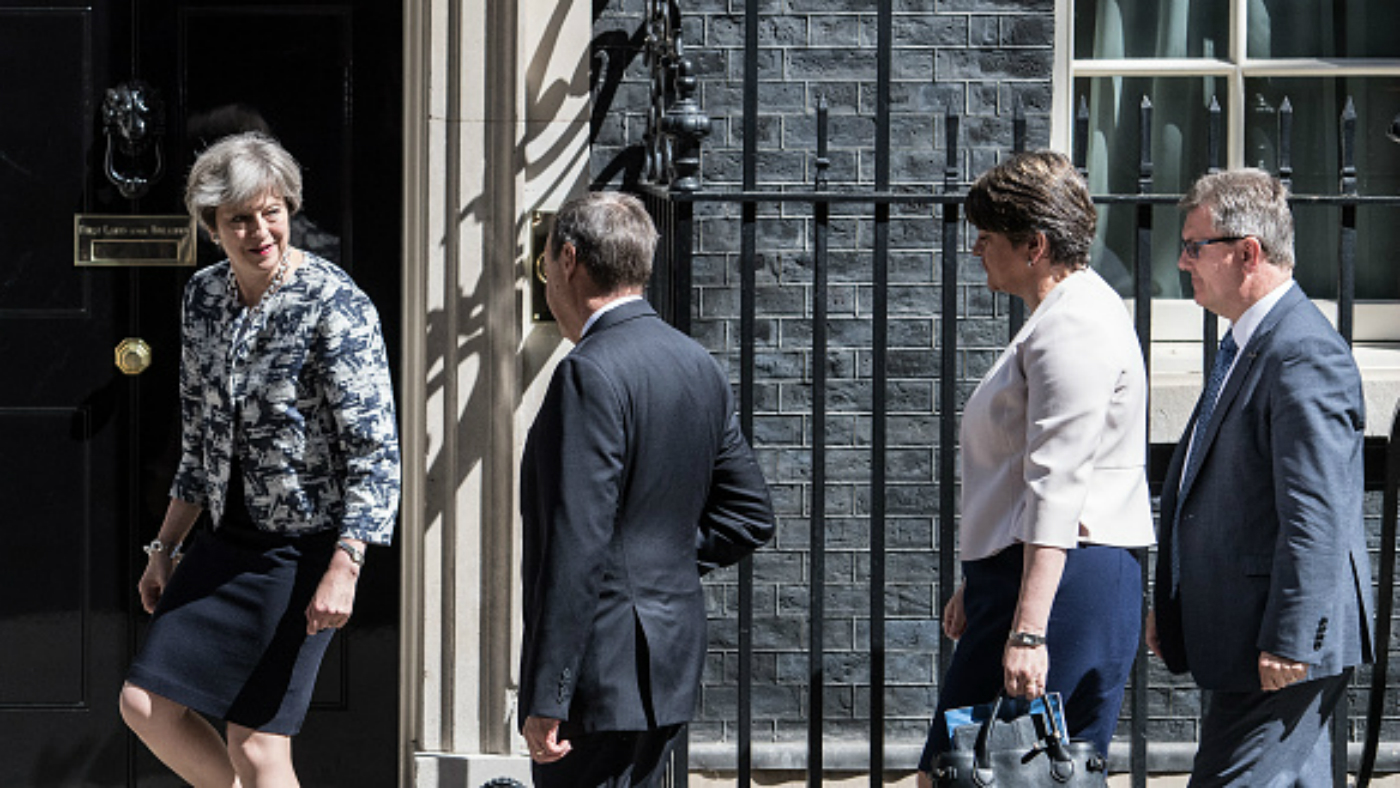Tory-DUP £1bn payment needs UK Parliament’s approval
Treasury requires ‘appropriate’ authorisation to hand over funds

A free daily email with the biggest news stories of the day – and the best features from TheWeek.com
You are now subscribed
Your newsletter sign-up was successful
The controversial decision to release funds promised for a £1bn “confidence and supply” agreement between the Conservative government and Democratic Unionist Party (DUP) must be approved by Parliament, it has emerged.
Following a legal challenge, the Government conceded that it needs approval before handing over the money promised by Theresa May to Northern Ireland to secure the backing of the ten DUP MPs on key votes.
No date has been agreed for securing that go-ahead. The Government is due to hand over the extra funding to Northern Ireland within the next two years under the terms of the deal to prop up the Tory minority government, the Daily Telegraph reports.
The Week
Escape your echo chamber. Get the facts behind the news, plus analysis from multiple perspectives.

Sign up for The Week's Free Newsletters
From our morning news briefing to a weekly Good News Newsletter, get the best of The Week delivered directly to your inbox.
From our morning news briefing to a weekly Good News Newsletter, get the best of The Week delivered directly to your inbox.
The latest complication emerged after Gina Miller, the campaigner who forced the Government to secure Parliament’s approval to start Brexit, challenged the legal basis for handing over the money, reports The Independent.
“It beggars belief that, neither at the time the Government sealed its dubious deal with the DUP in exchange for their votes in the Commons, nor at any point since, has the Government made it clear that the £1bn of taxpayers’ money for Northern Ireland could only be handed over following Parliamentary approval,” Miller told The Guardian.
Some MPs have said they are concerned about the DUP deal “especially as much of the country has already suffered from government cuts”, says the Daily Express.
But it is unlikely that any Tory rebels would vote against the payment, since it would undermine the vulnerable leadership, adds the paper.
A free daily email with the biggest news stories of the day – and the best features from TheWeek.com
'Brexit bunfight'
There is another headache looming for the Prime Minister this week as the Government faces its first major vote since the loss of its parliamentary majority.
MPs will today debate the second reading of the EU Withdrawal Bill, (previously known as the Great Repeal Bill). “Theresa May ought to be home and dry on this one, as Conservative Remainers don't want to play and her majority will in any case be bolstered by Labour rebels,” says the New Statesman’s Stephen Bush.
But as the BBC’s Mark D’arcy points out, the real action will come after the voting as backbenchers rush to table their amendments.
The Huffington Post’s Paul Waugh says: “There’s a first-come, first-served tradition, so expect a Brexit bunfight. All these late-night votes will give the Commons a 1970s air, with memories of the minority Labour government limping along.”
Bush agrees, saying: “Minority government is painful, which is why so many in business and at Westminster privately expect the Government to collapse sooner rather than later.”
-
 Nuuk becomes ground zero for Greenland’s diplomatic straits
Nuuk becomes ground zero for Greenland’s diplomatic straitsIN THE SPOTLIGHT A flurry of new consular activity in the remote Danish protectorate shows how important Greenland has become to Europeans’ anxiety about American imperialism
-
 ‘This is something that happens all too often’
‘This is something that happens all too often’Instant Opinion Opinion, comment and editorials of the day
-
 House votes to end Trump’s Canada tariffs
House votes to end Trump’s Canada tariffsSpeed Read Six Republicans joined with Democrats to repeal the president’s tariffs
-
 How corrupt is the UK?
How corrupt is the UK?The Explainer Decline in standards ‘risks becoming a defining feature of our political culture’ as Britain falls to lowest ever score on global index
-
 The Mandelson files: Labour Svengali’s parting gift to Starmer
The Mandelson files: Labour Svengali’s parting gift to StarmerThe Explainer Texts and emails about Mandelson’s appointment as US ambassador could fuel biggest political scandal ‘for a generation’
-
 Three consequences from the Jenrick defection
Three consequences from the Jenrick defectionThe Explainer Both Kemi Badenoch and Nigel Farage may claim victory, but Jenrick’s move has ‘all-but ended the chances of any deal to unite the British right’
-
 The high street: Britain’s next political battleground?
The high street: Britain’s next political battleground?In the Spotlight Mass closure of shops and influx of organised crime are fuelling voter anger, and offer an opening for Reform UK
-
 Biggest political break-ups and make-ups of 2025
Biggest political break-ups and make-ups of 2025The Explainer From Trump and Musk to the UK and the EU, Christmas wouldn’t be Christmas without a round-up of the year’s relationship drama
-
 The MAGA civil war takes center stage at the Turning Point USA conference
The MAGA civil war takes center stage at the Turning Point USA conferenceIN THE SPOTLIGHT ‘Americafest 2025’ was a who’s who of right-wing heavyweights eager to settle scores and lay claim to the future of MAGA
-
 ‘The menu’s other highlights smack of the surreal’
‘The menu’s other highlights smack of the surreal’Instant Opinion Opinion, comment and editorials of the day
-
 Is a Reform-Tory pact becoming more likely?
Is a Reform-Tory pact becoming more likely?Today’s Big Question Nigel Farage’s party is ahead in the polls but still falls well short of a Commons majority, while Conservatives are still losing MPs to Reform